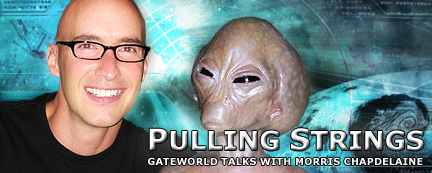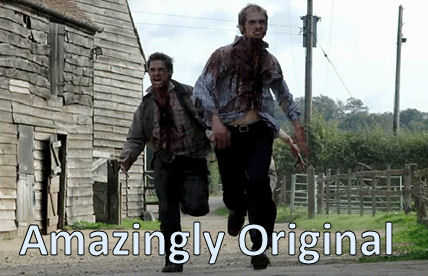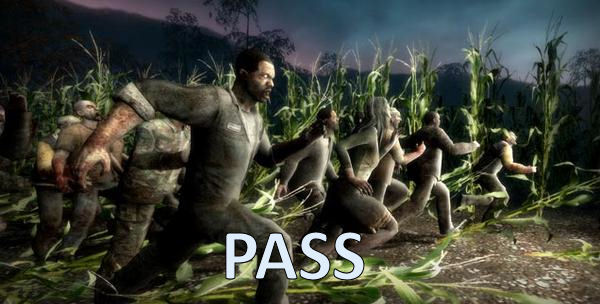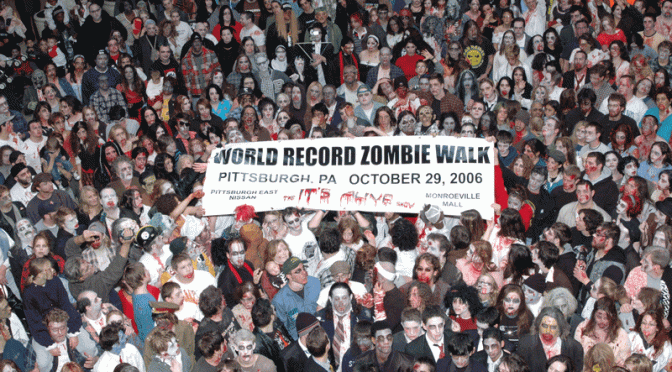After hearing a group of executives and agents talk about their opinion that science fiction sales were down because the audience had become jaded, I started to consider where they’d get that idea. The tastes of people shift from time to time, but they had this notion that the only way to sell scifi and fantasy was to ground them deeper into our mundane world and use the fantastic elements as little more than set dressing. So I started writing out some of the observations I had when dealing with people who weren’t fans of the genres (particularly scifi).
This particular entry was going to be two different posts. But after sitting and thinking about it, I’ve realized they’re much the same problem – a single problem that kind of appears different depending on what angle you’re seeing it from.
This one problem can be found even in the professional world and has probably led to that recent dip of popularity for science fiction and high fantasy that got me writing these posts. It also leads to problems mentioned in the previous posts. It’s almost the great unifier to all the others, really. And, for those of you who are writers of these genres, this is going to be hard to hear…
For non-fans, our favorite genres often fail to connect and sometimes that makes people think they’re… well… shallow.
All literature, all art, at some level, touches an emotional response. If you haven’t done that, you need to try again. This is why so many artistic types worry about just what kind of message they’re getting across. Some of them are rational about it and are happy with any sort of message they can get, others…not so much. But the point remains that, for anyone trying to live off of artistic works, not getting an emotional response is akin to not existing. Even fun, simple as it is, is an emotional response.
This is why romance novels have lasted forever. Regardless of how good or bad they are, or even how derivative they all might be, they still manage to illicit some sort of emotional response (even if that may be shame for reading it from time to time).
But what emotions do science fiction and high fantasy draw on usually? For people who are already fans, the depth of these stories is clear from the start. Unfortunately, for others, the same can’t always be said.
It doesn’t really make much sense if you consider the very nature of these genres. As I said in “Impact!”, these genres are the ones that should be the best utilized to study the human condition from angles that just can’t be touched by other genres. This is also the chief argument for supporters of the genre for why it is legitimate. But the examples we give usually require a great deal of explanation about why it means something before it makes sense to the uninitiated.
Back in the day, when science fiction was in its infancy, writers had a fascinated audience that ate up these bizarre concepts we were scribbling down, anchored loosely in reality. High fantasy has always been popular in one way or another due to the fact it peers into another world that would never be. But science fiction? That peered into a world that could be and it excited people in a way that we didn’t think possible. Then, as the genre grew and matured over the years, we found our niche, the place we were most welcomed in our society.
Unfortunately, this could be argued to have been a bad thing.
By finding our niche, we set up a base for us to build upon. We were able to start studying our market and understanding what worked, what didn’t work and how well it would probably be received. It was a lot of trial and error, and sometimes audiences didn’t click right away (Brave New World flopped in the 30s, now considered a classic). But while we eventually figured out what worked and what didn’t work, we slowly started to build a barrier of entry.
Don’t get me wrong, some of the stuff made as the genre was finding its groove was fantastic and every generation has had its great works. The ideas behind dystopian stories like Brave New World and Nineteen Eighty-Four still haunt us. Isaac Asimov’s books left an impression on people so profound that we still have people talking about robots in his terms. The works of Philip K Dick were mind altering in many ways. There was always meaning, but it often requires an interest in the surface level ideas before you can become emotionally attached . Not to say that we should have to “dumb it down”, but rather to say that the audience doesn’t instinctively connect as they once did.
Back at what could be called the height of science fiction, the space age was on everyone’s mind. We were launching ships into orbit and the human race knew that we would find life somewhere else in the universe. We started to look to Mars for signs of life, listened to the stars for a chance to hear an alien civilization’s greeting and watched the skies for objects that could confirm our hopes. So science fiction, perfectly suited to respond to this, started to write stories that captured the imagination of what could happen in the not too distant future.

Unfortunately, Mars is barren, the heavens are still silent and that glowing object was probably a weather balloon or military flare. Reality quickly started to set in on the subject and it became clear the aliens of our imaginations required someone behind the curtain…

Even for more terrestrial ideas we slowly found ourselves disappointed in what we had. There are no witty robots doing our chores and it turned out that flying cars are a bad idea. The futuristic concepts that people of the 50s and 60s thought would come are now mocked for being kind of unrealistic. But at the time, people believed.
It started to become hard for the audience to remain excited about subjects that were less than what they’d hoped they would be. But, while it may seem like I’m repeating the argument that they’ve grown jaded, it isn’t so much that they stopped caring but rather we aren’t always trying to make them care. We write stories for other people like us and forget that some of the people not like us could love it as much as we do if we gave them an opening. This doesn’t mean changing everything, rather that we should include something fundamental to everyone in the mix.
Frankly, if you look around enough you’ll start to see quite a few industry insiders don’t really understand this either. A lot of theories started to bounce around over the last few years, a little bit of what could probably be considered panic set in and people started to duplicate anything that was working and hoped for the best. You can see that today when you look at the success of Twilight and take note that all of a sudden True Blood and the Vampire Diaries have gotten TV series when their books had been practically ignored for years before that. And, while those are paranormal romance and urban fantasy, it’s the same industry making a lot of these decisions.
High fantasy and science fiction are plagued with this issue of trend chasing. Though there are some brilliant examples coming out lately of people taking risks, a lot of times those risks aren’t rewarded like they should be. A great deal of high fantasy stories published in the modern day look like they were scraped off of the editing room floor of Lord of the Rings. Meanwhile, an equally large portion of science fiction can be said to have been scribbled down as the last words of Gene Roddenberry or Issac Asimov from their death beds. What doesn’t fall into these categories is typically what can be called the “my blank are different” response. You don’t have elves anymore, no, you have nymphs.
This can be done well, but it’s a trope to be approached cautiously because, if done poorly, it can appear tad lazy and will make that outside audience simply roll their eyes. If someone didn’t like the setting before, just changing a few details isn’t necessarily what’s going to draw them in. There has to be a story or meaning behind it that they can attach to.
But, going beyond simply doing it badly, something that really gets to me is what I’ve come to call the “Fast Zombie Problem”.

While there’s no problem in presenting a new take on an old idea, sometimes people take the “our blank are different” trope to an extreme and just lean back on a single, almost arbitrary change. They shuffle the deckchairs a little and hope this minor adjustment will be enough to kick start new interest. This sort of story development leads to the shallow perception I mentioned earlier.
If you’re relying only on that single novelty you’re often telling an otherwise derivative story and hoping people react to it like it’s new. And the strange thing is, only in speculative fiction can you really get away with this kind of thinking. Anywhere else, you would have to have an interesting story to tell beyond the novelty. But in speculative fiction there’s an odd acceptance of the novelty as a major change. I think it’s because we’re a genre that is so heavily based on the question of “what if?” that we don’t immediately recognize that it’s a little silly. And the best example of this is why I call it the “fast zombie problem”:
“My story is about zombies.”
“Oh? What’s your story about?”
“Well they’re zombies, so it’s a zombie story, but they’re fast zombies, so it’s more intense!”
“Brilliant!”

Now, fast zombies are a concept that really only find footing in film because on the page they don’t really read all that different. But this is the same sort of thinking that you’ll find in a lot of speculative fiction that doesn’t find its audience. And, when you really look at the suggestion “the audience is jaded so we need to start rolling back the settings and plot devices they don’t like anymore” – it’s the same basic failing. In both cases, people focus on the novelty and kind of lose the plot behind it.
If sales do drop, we don’t need to shuffle the deck chairs, we need to start thinking about the story we’re telling more than the elements within it. It’s not enough to simply try to coast by on the novelty of concepts that sometimes aren’t even novel anymore. But is the solution really to pull back everything that existed? No, I think that we need to start pushing it again. We need to stop working within the boxes that were structured before most of us were even born and start figuring out just where we can take it. We need to start expanding and giving depth rather than move the set pieces from one end of the stage to the other. We are writing, creating visions and expressing ourselves to the rest of the world. We are not practicing our Feng Shui.
The greatest examples of science fiction and high fantasy aren’t just minor alterations to an existing template. These stories build worlds and tell you the story of the people who live in those worlds. They give you depth and richness to work with. They move in the exact opposite direction from that idea of stripping the genre of its fantastic elements. They make an effort to strike a chord with people and to think outside of the box about how they’re going to get there.
And even in sub genres where not a whole lot gets changed, like the zombie movie, there are entries where you can see the effort to build a world and take a genuinely different look at the genre. You can see when people did their best to put in the effort behind character, plot, and tone. Need proof? Ask yourself how interesting Zombieland would be…
If the characters weren’t so colorful.
As for the worlds I build, I like to think I did decent job of building a world and making characters people could get behind in Agent of Argyre. So, please, give them a look.







